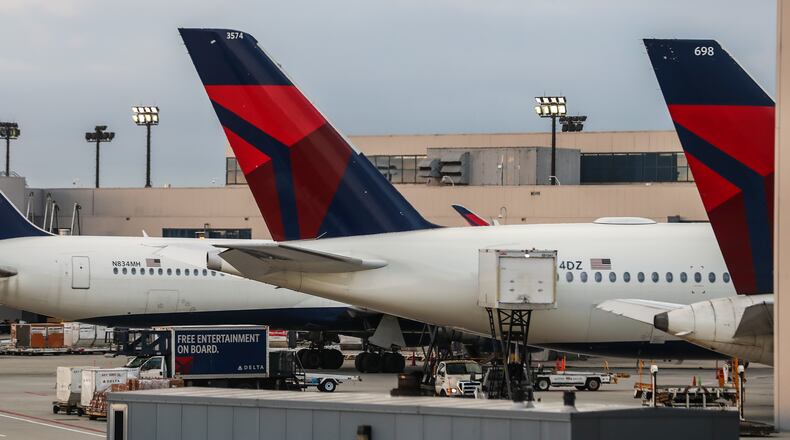Delta Air Lines reported a $1.3 billion profit for 2022, reaping the benefits of a strong rebound in travel and high air fares paid by consumers clamoring to return to the skies.
As a result of the profits, the Atlanta-based airline will pay out $563 million in profit-sharing bonuses to its employees on Valentine’s Day. It comes after leaner times earlier in the pandemic, when employees went through a harsh period of cutbacks.
Delta CEO Ed Bastian said Friday that employees “rose to the challenges of 2022.”
“In my opinion 2022 was the most difficult operational year in our history, and was capped off by severe winter storms over the holidays,” Bastian said.
This year, Delta expects to continue its recovery from the impact of the pandemic, forecasting 15-20% growth in revenue as it works to fully restore its flight schedule by this summer.
But the company also expects to see labor costs rise, cutting into first-quarter profits — including the impact of a proposed new pilot union contract to include an initial 18% pay increase. The pilots union this week finalized a tentative agreement that will be considered by union officials before it can go to a vote by rank-and-file pilots.
Delta reported a profit for last year despite high fuel costs exacerbated by Russia’s invasion of Ukraine and stronger global demand. The airline also grappled with a summer of flight disruptions and a hiring blitz to replace staff it cut when the COVID-19 pandemic slammed air travel and pummeled the economy.
The company brought in nearly $50.6 billion in revenue last year, up from less than $29.9 billion in 2021 and better than its record pre-pandemic 2019 revenue of $47 billion.
Delta’s operating expense grew to $46.9 billion in 2022, up from $28 billion in 2021. Fuel expense doubled to nearly $11.5 billion in 2022.
Severe winter weather during the December holidays caused thousands of flight cancellations on Delta, which drove 1 percentage point of increase in unit costs.
But that was not as severe an impact as experienced by Southwest Airlines, which had a meltdown of its operations over the Christmas travel period with a whopping 16,700 flight cancellations. All in all, that will end up costing Southwest $725 million to $825 million.
Delta president Glen Hauenstein said that once Delta had recovered from its holiday cancellations and Southwest “was not back in full swing, we had an uptick in our bookings,” as Southwest passengers looked for alternatives to get to their destinations.
It’s an example that shows while Delta struggled through flight disruptions over the summer and holidays, so did other airlines. In spite of its difficult operational year, Delta ranked No. 1 for on-time performance in 2022 among the airlines in North America ranked by aviation analytics firms Cirium and OAG.
Bastian noted the industry’s “fragility” and said: “The most important thing we can do is restore confidence to the traveling public.”
In the wake of an FAA system outage that led to thousands of flight delays Wednesday, Bastian said on CNBC on Friday morning that he doesn’t recall such a shutdown of the national airspace due to a technology outage. “It’s unacceptable,” he said.
“I lay this on the fact that we are not giving [the FAA] the resources, the funding, the staffing, the tools, the technology that they need to modernize,” Bastian said. “Hopefully this will be the call to our political leaders in Washington that we need to do better. ... We’ve been asking for this for years.”
Among airlines, Bastian said, “We all in the industry owe it to our customers to make sure we don’t fly in excess of our capabilities.”
Delta has hired 25,000 new employees over the last year — making up more than a quarter of the company’s workforce of 90,000. The rapid hiring has strained the airline, due to training bottlenecks for pilots in particular and the need to dedicate large numbers of current employees to training of new hires.
Delta plans to focus on restoring flights in Atlanta and other core hubs this year. The airline’s flight schedule is about 85% restored at Hartsfield-Jackson, and is expected to be 95% restored by summer and 100% restored by fall, according to Delta President Glen Hauenstein.
In the fourth quarter, Delta had $828 million in profit, a significant improvement from its $408 million loss a year earlier. The company’s quarterly operating revenue was $13.4 billion, up from $9.5 billion in the year-ago quarter.
In the fourth quarter, Delta’s domestic passenger revenue was 7% above 2019 levels, and international passenger revenue was up 5%. Domestic corporate sales reached 80% of 2019 levels.
Looking forward, it’s yet to be seen how economic turmoil could affect demand for air travel later this year.
Hauenstein signaled optimism, saying “We’ve seen very strong post-holiday demand.”
About the Author
The Latest
Featured



